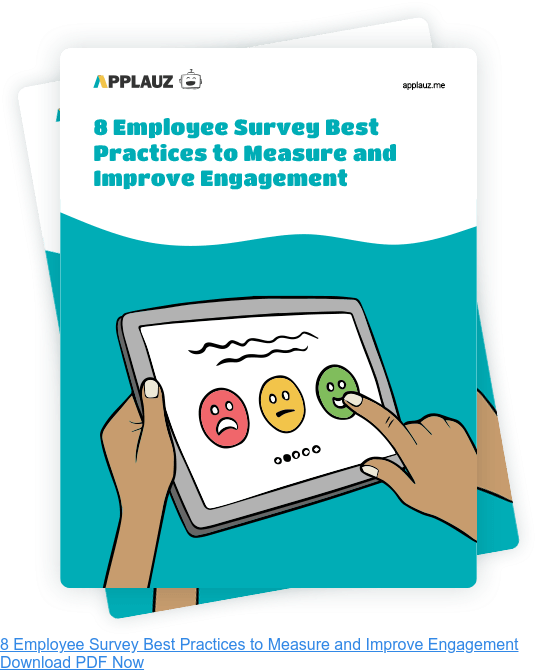There are silent employee engagement killers that can send your best people looking for new opportunities. A recent Gallup survey revealed that in 2023, disengaged employees continued to feel more detached from their employers.
Workers have less role clarity, lower levels of satisfaction, and feel less connection to the mission and purpose of their organization than they did four years ago. They are also “less likely to feel someone at work cares about them as a person.”
These are just some of the different elements that make up employee engagement. Gallup tracks them on a regular basis, but they are easy to miss. Since you can’t exactly fix something that you don’t know is broken, you need ways to stay aware of the true state of employee engagement levels in your team.
Enter employee engagement surveys, which can provide meaningful feedback and radically transform your people and culture strategies.
 What Is An Employee Engagement Survey?
What Is An Employee Engagement Survey?
An employee engagement survey is a tool that can help you gauge the level of engagement, satisfaction, and motivation among current employees. It includes a series of questions designed to garner valuable insights about different aspects of the employee experience and work environment.
From job satisfaction to perception of leadership and company culture to opportunities for career growth and organizational values, the survey can help you gather employee perceptions on a variety of topics.
Employee engagement surveys are typically anonymous since their purpose is to help employers capture employee sentiment l. By collecting anonymous feedback, organizations can identify how to best support their workers and enhance morale, productivity and retention.
While there are different ways to deploy employee engagement surveys, they are usually conducted on a periodic basis to help inform strategic decisions and optimize HR efforts. For example, if an area of improvement is uncovered during the first round of a survey, a follow-up survey can assess whether any changes made have been fruitful six months later.
 Benefits of Employee Engagement Surveys
Benefits of Employee Engagement Surveys
From enhancing communication and transparency to providing organizations with the opportunity to boost key metrics of the employee experience, employee engagement surveys offer several benefits.
- Insight into Employee Experience: Surveys can help you learn how employees feel about their work, their team, their team leader, and the organization as a whole. This feedback helps you understand which areas of employee engagement are at risk – and which ones are strengths to leverage.
- Identifying Blind Spots: When you are equipped with the right information, you can make the right decisions. The information provided by employee engagement surveys helps leaders identify blind spots and focus their efforts on addressing areas of concern while reinforcing positive aspects of their culture.
- Improving Morale: By actively requesting feedback from employees and taking action on it, employers send a powerful message. They show that they value what their employees think and how they feel at work. When employees see that their employers are committed to creating a positive work environment, it can lead to increased morale, job satisfaction and loyalty.
- Communication and Transparency: Surveys offer a platform for open and honest communication between team members and leaders. They encourage dialogue about important issues and foster transparency.
- Career Development and Retention: Surveys can help identify opportunities for professional growth and development. If you identify concerns related to career growth, you can provide additional opportunities for skill development, which, in turn, will increase retention.
- Increasing Productivity and Performance: Studies show that engaged employees are more productive and dedicated to achieving their goals. Employee engagement surveys have a direct impact on performance improvements because they address hidden causes of disengagement.
- Employer Brand and Reputation: Organizations that care about employee engagement and make it a priority by acting on survey feedback are more likely to be viewed as desirable employers. Surveys help promote a positive workplace culture, which strengthens your employer brand and helps attract talent.
- Reducing Absenteeism and Turnover: Engaged employees are less likely to “quiet quit” or leave. By improving employee engagement strategies through the use of surveys, organizations can reduce absenteeism and turnover, saving time and money associated with recruiting and onboarding new hires.
 90+ Highly Effective Employee Engagement Survey Questions
90+ Highly Effective Employee Engagement Survey Questions
Ready to run your own employee engagement survey? To make the most of the exercise, asking the right questions is key. Here are over 90 highly effective employee engagement questions designed to elicit constructive feedback that span across different aspects of the work experience that can impact engagement.
Employee engagement survey questions about overall employee satisfaction
- How satisfied are you with your job?
- Do you see yourself still working here in the next few years?
- Does your company’s mission and vision inspire you?
- Do you feel like a valued member of your team?
- Would you recommend this company as a great place to work?
Employee engagement survey questions about company culture
- How would you describe the overall organizational culture?
- Do you feel that the company's culture supports a positive work environment?
- Do you believe that the company fosters a culture of [value] and [value]?
- How strong do you feel is the alignment between organizational decisions and values?
- How effectively are company values demonstrated in day-to-day operations?
- How well do you think senior leaders embody company values?
- To what extent do you believe that your work contributes to upholding organizational values?
Employee engagement survey questions about leadership and management
- Do you feel that your manager is invested in your success?
- Does your manager provide clear expectations and objectives?
- How well does your manager communicate organizational goals and priorities?
- Do you feel that your manager values your input and feedback?
- Are you comfortable sharing feedback and concerns with your manager?
- How would you rate the level of trust between team members and managers?
- Do you believe that your manager effectively addresses conflict and challenges within the team?
- How would you rate the overall quality of leadership within the organization?
Employee engagement survey questions about career development
- Do you feel that your organization provides enough opportunities for career advancement and growth?
- Do you feel encouraged to seek opportunities for growth and learning?
- Do you feel that there are clear paths for progression and growth in your current role?
- How supported do you feel in pursuing opportunities for advancement?
- How helpful do you find the training and development resources provided by the organization?
- Are you satisfied with the opportunities for mentorship and coaching available to you?
- Do you feel supported in developing new skills related to your career goals?
Employee engagement survey questions about physical workplace environments
- How would you rate the physical workspace in terms of comfort, safety, and accessibility?
- Do you feel that the on-site facilities and amenities support your productivity and safety?
- How satisfied are you with the cleanliness and maintenance of the work environment?
- How would you rate the remote work setup provided by the organization?
- How satisfied are you with the tools available for remote work?
- If you’re a hybrid worker, do you find yourself easily able to adapt between on-site and off-site work?
Employee engagement survey questions about individual roles and responsibilities
- How clear are the responsibilities in your current role and job description?
- Are changes in responsibilities and expectations effectively communicated?
- Do you have a clear understanding of the way your role contributes to overall organizational goals and priorities?
- Are there defined performance expectations and metrics for your role?
- Do you feel empowered and encouraged to make decisions in your role?
- Do you feel that you are leveraging your skills and strengths enough in your current role?
- How satisfied are you with the variety and complexity of tasks and projects assigned to you?
- Do you feel adequately challenged in your role?
Employee engagement survey questions about communication and feedback
- How satisfied are you with the feedback you receive on your performance and work?
- Do you feel that performance feedback sessions are constructive and help you develop your strengths?
- Are you satisfied with the timeliness and frequency of feedback that you receive on your work contributions?
- How satisfied are you with the level of transparency around changes and decisions that affect your work?
- How well does the organization foster open and honest communication?
- How satisfied are you with the channels of communication available for sharing ideas, concerns, and feedback within the organization?
Employee engagement survey questions about recognition and rewards
- How satisfied are you with the frequency and fairness of recognition within your organization?
- Do you feel that your efforts and contributions are appreciated?
- Are you satisfied with your organization’s employee recognition program?
- How well do recognition and rewards align with your individual preferences for being recognized?
- Do you feel that the current recognition and rewards efforts motivate you to perform at your best?
- Are you satisfied with the transparency and consistency of the criteria used for recognition and rewards?
- Do peers provide you with recognition for your accomplishments at work?
Employee engagement survey questions about work relationships
- How would you rate the quality of relationships, team dynamics, and collaboration in your team?
- Do you feel that there is mutual respect and trust among team members?
- How satisfied are you with the level of support and cooperation you receive from peers?
- Are you comfortable seeking assistance or advice from peers when you need guidance or support?
- How well do you feel your team addresses issues or conflicts when they arise?
- How satisfied are you with the level of camaraderie and social interaction within the organization?
Employee engagement survey questions about employee well-being
- How would you rate your current stress levels related to work?
- Do you feel that your workload is manageable?
- Have you experienced feelings of burnout or exhaustion due to work-related demands?
- Do you feel that the organization supports your efforts to maintain a healthy work-life balance?
- Are you aware of the resources and support services available to you for managing stress and fostering well-being?
- How satisfied are you with resources such as employee assistance programs and wellness initiatives?
- Do you believe that your job supports your well-being?
Employee engagement survey questions about Diversity, Equity and Inclusion
- How would you rate the organization's efforts to promote Diversity, Equity and Inclusion?
- Do you feel that the organization celebrates diverse perspectives?
- Do you feel that the organization fosters an inclusive environment for all employees?
- How satisfied are you with the fairness and equality of opportunities for career advancement within the organization?
- Do you believe that all employees have equal access to opportunities for advancement within the organization, regardless of their background or identity?
- Have you witnessed bias or discrimination in the workplace?
Employee engagement survey questions about compensation
- How satisfied are you with your overall compensation package, including salary, bonuses, and benefits?
- Do you feel that your compensation is fair and competitive for your industry?
- How satisfied are you with pay transparency within your organization?
- Do you believe that your compensation reflects the value you bring to the table?
- How satisfied are you with the opportunities for performance-based monetary incentives within your role?
Employee engagement survey questions about organizational change
- How well do you feel that senior leadership communicates about upcoming changes and the reasons behind them?
- To what extent do you believe that the organization considers and addresses the potential impacts of changes on employees?
- How would you rate your organization’s change management practices?
- How supported do you feel when it comes to navigating organizational changes?
- How satisfied are you with the level of involvement you have in change initiatives?
 Employee Survey Questions for Pulse Surveys
Employee Survey Questions for Pulse Surveys
Now that you have a variety of questions to inspire your next employee engagement survey, you may want to consider conducting pulse surveys on a regular basis.
What’s a pulse survey? It’s a short survey designed to quickly gather employee feedback around specific areas of concern or topics. You can use them as often as monthly to assess your employee engagement strategies or get meaningful feedback on recent organizational changes.
The idea of a pulse survey is to keep things short and sweet – a handful of questions is enough. They have to be straightforward, quick and easy to complete so employees can provide their feedback in a matter of minutes. The goal of a pulse survey is to gather real-time insights and monitor trends, helping you remain agile and responsive to the subtle shifts in employee experience within your organization.
Here are simple yet impactful question examples you can ask in a pulse survey.
- On a scale of 1 to 5, how satisfied are you in your current role?
- Do you feel valued and appreciated at work?
- How likely are you to say that your organization is a great place to work?
- Are you satisfied with the level of communication from leadership regarding company updates and priorities?
- Do you feel that your opinions and feedback are taken into consideration at work?
- Do you feel supported by your managers when it comes to achieving your professional goals?
- Are you satisfied with opportunities for growth and advancement within the organization?
- How would you rate the overall morale among your team members?
- Do you feel that the organization encourages a healthy work-life balance?
- How motivated are you to make the extra effort to go above and beyond in your role?
 How to Make the Most of Employee Engagement Survey Questions
How to Make the Most of Employee Engagement Survey Questions
Ready to make the most of your employee engagement survey? There are a few key best practices to consider during the whole process.
- Align Questions with Organizational Goals: Make sure that your survey questions actually reflect your organization’s goals and priorities so you can gather feedback that directly impacts key areas of focus. For example, if you’re working hard on building a culture of recognition, include specific questions about employee recognition in your survey.
- Use Clear and Straightforward Language: Use clear, straightforward language in the survey questions to avoid confusing employees. Keep the questions short and concise and make it easy for team members to respond without scratching their heads.
- Include a Mix of Question Types: Incorporating a mix of question types is also key and will provide a variety of both qualitative and quantitative insights. Include multiple-choice, open-ended, and scale-based questions to gather different types of data. This provides a more comprehensive view of the employee experience.
- Focus on Actionable Insights: Remember that the primary objective of the survey is to solicit feedback that you can use to make meaningful changes and improvements. Use questions that will elicit feedback about aspects of the workplace that you can actually act upon.
- Ensure Anonymity: Assure employees that all their survey responses will be kept confidential and anonymous. This is a crucial piece of the puzzle of gathering candid, honest feedback and understanding what’s really going on below the surface.
- Provide Context: Clearly communicate the purpose of the survey before running it. Explain how the feedback will be used to drive continuous improvements within the organization. This will help you increase participation levels.
- Involve Employees in the Process: Involving employees in the survey design process is also a good idea. Solicit their input on potential areas of focus and questions to ask. Not only can this guide your efforts, but it can also foster a sense of buy-in in the survey process.
- Communicate Results and Action Plan: Once you’ve collected and analyzed survey data, keep people in the loop. Communicate the results to employees and outline action plans based on the feedback gathered.
- Follow-up: Running an employee survey once is not enough. Regular feedback plays a crucial role in assessing job satisfaction levels and employee happiness. Keep checking in on a regular basis and monitor trends. You may improve one dimension of employee engagement only to realize that another one has worsened. Real change takes time and continuous monitoring.
- Continuously Optimize: It’s perfectly normal and even expected to iterate on your employee engagement survey and refine the questions over time. The feedback you get may lead you to focus on some areas over others or highlight different needs. Continuously optimizing your survey questions ensures that the survey remains relevant and effective in assessing engagement levels.
Management guru Peter Drucker once said that you can’t manage what you can’t measure. This is true when it comes to employee engagement – but that doesn’t make it any less tricky. You’re dealing with human beings and the complex facets that make up their motivation and morale.
Thankfully, with the right set of survey questions, you can get a good idea of the true state of employee engagement within your organization. Knowing what’s going on is only half the battle – you’ll also need to use your newfound insights to improve things, but at least you’ll be equipped with the knowledge to make informed decisions.
 Boost Engagement with Applauz
Boost Engagement with Applauz
If you discover that things are lacking in the employee appreciation and recognition area, a platform like Applauz can help you turn the situation around and boost both morale and productivity.
Not only does Applauz allow you to create a fully personalized, 360-degree employee recognition program, but it also lets you prop up other aspects of the employee experience, such as improving communication and transparency and setting goals.
Book a demo to take a tour of the platform and see how it can support your team’s needs.
About the author
Anouare Abdou
Anouare Abdou is a seasoned HR and business writer passionate about leadership, productivity, and the future of work. Her words have appeared in Business Insider, The Ladders, Thrive Global and more.



